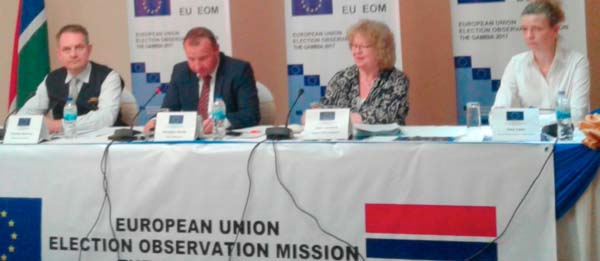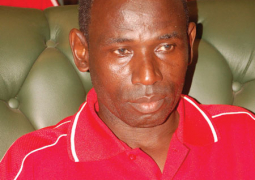
Chief
Observer Miroslav Poche, a member of the European Parliament from the Czech
Republic, has said that the highly contested National Assembly elections were
held in a calm and peaceful atmosphere, following an engaging campaign where
fundamental freedoms of assembly, expression and association were respected,
while media presented the electorate with a range of political choices free of
formal censorship.
“The
Independent Electoral Commission enjoyed broad stakeholders’ trust and, against
budgetary and time constraints, delivered elections in a commendable manner,”
he said.
He
made this remarks during a press conference on Saturday held at the Ocean Bay
and Resort, Cape Point, Bakau.
He
added that this happened despite a highly imperfect electoral framework
inherited from the past regime, where judiciary was systematically undermined
and respect for regional and international standards for democratic elections
was neglected.
On
6 April, 56 EU EOM The Gambia 2017 observers drawn from EU member states,
Norway and Switzerland observed Election Day proceedings in 222 polling
stations across the country.
The
tabulation of results was observed in all regional collation centers. The
Election Day proceeded in an orderly manner, and knowledgeable polling station
staff efficiently facilitated voting.
The
counting of ballot marbles proved to be swift and transparent. The lack of
transparency and accountability measures, stemming from the absence of written
procedures for the collation of results, detracted from the overall very
positive assessment of opening, voting and counting.
The
immediate announcement of aggregated results per constituency on national
television and radio fostered transparency. “The European Union sees The Gambia
as an important partner. The invitation to deploy the first ever fully-fledged
election observation mission is highly appreciated by the European Union.
It
confirms the commitment of both sides to promoting democracy and deepening
political and economic cooperation. The European Union stands ready to support
the reform agenda launched recently by the government of The Gambia,” stated EU
EOM The Gambia 2017 Chief Observer Miroslav Poche.
Outlining
areas for future improvement, observers concluded that large population
discrepancies between electoral constituencies violated the principle of equality
of the vote. Furthermore, the outdated voter register and absence of measures
enabling police and polling staff to cast their votes at their duty stations
disenfranchised a considerable number of eligible voters.
The
mission also noted that the absence of a complete Supreme Court bench ready to
adjudicate on election petitions would undermine respect for the right to a
timely and effective remedy. The EU EOM The Gambia 2017 commended the civil
society commitment to the democratic process, as shown by the deployment of 400
citizen observers on the Election Day.
“The
Gambia has been through a historical moment with many things changing almost
overnight. A few shortcomings have been identified in the election conduct.
However, given the circumstances, I would like to express my great respect to
the IEC as well as to the Gambian citizens for the peaceful atmosphere of the
election day,” noted Jean Lambert (United Kingdom), head of the European
Parliament delegation which joined the EU EOM The Gambia 2017 on 4 April and
fully endorsed the preliminary statement.
The
EU EOM The Gambia 2017 preliminary findings are based on long-term, nationwide
observation, the first ever the EU has conducted in The Gambia.
The
mission has been present in the country since 13 March and will remain to
observe the adjudication of post-election complaints, if any.
The
mission’s final assessment of the elections will depend, in part, on the
conduct of the remaining stages of the elections, including the handling of
possible post-election disputes.
A
comprehensive final report, including recommendations for potential
improvements, will be presented to the IEC, Gambian authorities and other
electoral stakeholders for their consideration, approximately two months after
the conclusion of the process.


